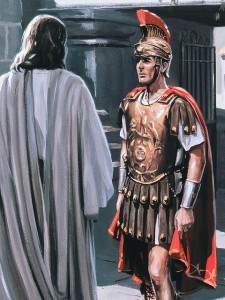 Matthew 8:5-13 contains this familiar story:
Matthew 8:5-13 contains this familiar story:
When Jesus had entered Capernaum, a centurion came to him, asking for help. “Lord,” he said, “my servant lies at home paralyzed and in terrible suffering.”
Jesus said to him, “I will go and heal him.”
The centurion replied, “Lord, I do not deserve to have you come under my roof. But just say the word, and my servant will be healed. . . .”
When Jesus heard this, he was astonished and said to those following him, “I tell you the truth, I have not found anyone in Israel with such great faith. . . .”
Then Jesus said to the centurion, “Go! It will be done just as you believed it would.” And his servant was healed at that very hour.
We tend to read this story as one of many healing miracles of Jesus. Oh – look how great Jesus is that he could heal someone even from a distance. This chapter in Matthew contains many healing miracles.
But instead of seeing this story as one more healing miracle, we need to see what is special about this situation and put ourselves into the story.
First, we have a Roman coming to Jesus. The Romans were the enemies of the Israelites and Jesus is pretty clear in other places that he came to heal the Israelites first. Although Jesus often talks to people outside of a specific group, he has very few dealings with Romans.
Second, this man was a centurion, a leader of 100 Roman soldiers. He was probably in charge of the soldiers who kept order in Capernaum, walking the streets every day and shoving the Israelites around. He was battle-tested, because you don’t get to be a centurion unless you have proven yourself. And he was accustomed to being in charge, not asking for favors.
Third, it was the centurion’s servant who was sick, not a child or family member. Many Roman soldiers were single because their lives were very uncertain. They could be transferred to another place at a moment’s notice. A servant might be the closest friend a centurion would have – someone who tended to his needs and served as a confidant when the centurion could not confide in his superiors or the soldiers under him. This centurion was more than inconvenienced by the sickness of his servant: he was distressed by the illness and possibly losing his closest friend.
Fourth, the centurion was a man of faith. He calls Jesus “Lord,” recognizing that Jesus has authority over illness and death. Somehow the centurion had heard of Jesus and accepted that he was the Son of God, the Messiah. Perhaps living among the Jewish people had rubbed off on the centurion and he was also looking for the Messiah to come. He just recognized Jesus sooner than the Jewish leaders. The centurion does not want Jesus to come to his house – he does not deserve the favor of the Messiah.
Finally, the centurion understands the chain of command. Just as he can order around the soldiers under his command, so he must obey the orders of his superiors. The centurion recognizes Jesus as a superior and knows that if Jesus but says the word, all the powers of the world must obey him.
Even though Jesus calls the centurion a man of great faith, the centurion knows that he does not deserve any special consideration of the Messiah. Yet he dares to ask, loving his servant and wanting his friend restored to health. And then he trusts Jesus to answer, even at a distance.
We do not deserve the favor of our Savior Jesus. How brash and bold we are to invite Jesus into our homes each day, into our churches each Sunday. We need to take a lesson from the centurion. Lord, we do not deserve – but still we ask. Give us the faith we need to trust in your answer.
